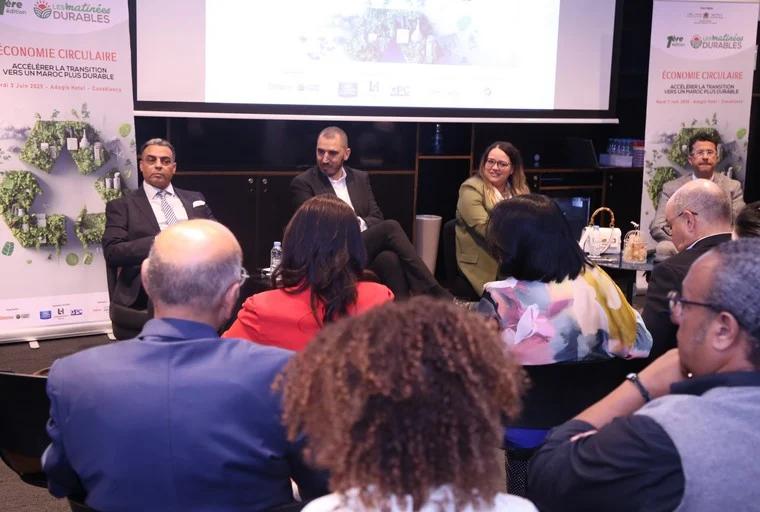Participants in panels held as part of the 1st edition of the “Sustainable Mornings” emphasized, on Tuesday in Casablanca, the need to rethink the economic model of waste management to achieve a true circular economy.
On this occasion, the speakers, representatives of companies active in both the production and valorization of waste, unanimously agreed that the transition to a circular economy requires a profound change in paradigm, as well as a major evolution in citizens’ perception of waste, now considered a resource rather than mere refuse.
This direct connection facilitated continuity in reflection and opened the way for discussions on concrete, pragmatic, and potentially operational solutions in the short term.
Thus, Driss Nahya, General Manager of Polluclean, stated that his company specializes in the management of industrial waste from various sectors such as the chemical, petroleum, agri-food industries, large-scale retail, and the energy industry.
Industrial waste presents a high degree of heterogeneity, as it can be solid, liquid, or packaged in various ways, he explained, adding that Polluclean has developed specific expertise allowing it to extract from this waste the recoverable fractions, either as materials or as energy.
Mr. Nahya noted that despite the existence of a legal framework, waste collection and treatment remain insufficient, estimating that the sector requires structuring around professional actors, strengthening control, and supporting the financing of treatment infrastructures.
For his part, Mourad Adali, Vice President of the Moroccan Association for Recycling and Valorization of Plastic Waste (AMRP) and Vice President of the Moroccan Plastics Federation (FMP), shared his field experience and his vision of a circular model where plastic becomes a resource.
He indicated that the circular economy market has gone through several phases (historical, legal, legislative, political, societal, and industrial), reminding that the FMP is, to this day, the only one to have voluntarily and continuously accepted to pay the eco-tax.
As part of his vision for this economic model, the federation has set up an Economic Interest Group (GIE) dedicated to plastic recycling, Mr. Adali informed, specifying that this GIE is designed to unite Moroccan companies in the sector, providing them with a structured collaborative framework.
He continued: “We have also proposed to the government a concrete initiative, namely the creation of sorting and valorization centers in each city of the Kingdom, managed by a board of directors including both economic, political, and territorial actors.”
For his part, Mounir El Bari, General Manager of GPC Carton and Paper and President of the Coalition for Waste Valorization (COVAD), pointed out that waste management is no longer sufficient and that it is imperative to move to a circular economy model.
This new paradigm aims to break away from the linear economy – produce, sell, and consume – to adopt a logic of reuse and valorization, he detailed, emphasizing the extended producer responsibility (EPR) to hold manufacturers accountable for recycling their products.
Mr. El Bari also cited the example of paper-cardboard, whose success is due to a stable economic model based on a fixed price for 30 years, which has allowed for a high collection rate.
This system encourages economic actors to invest in the collection and recycling chain, as they have visibility, he explained, noting that local manufacturers cannot process everything, which has led to partial authorization for export, although the priority remains local transformation to create value.
Mr. El Bari further illustrated the relevance of this model with the packaging sector, essential for the competitiveness of Moroccan products for export, insisting that good packaging, made from recycled materials, can be a competitive factor against foreign competition, while strengthening the national industry and fitting into a true circular economy logic.
This first edition of the “Sustainable Mornings” was also an opportunity for Nawal Rommache, Head of the CSR department at Label Vie, to highlight the various initiatives launched by the group over the years, as part of its environmental policy and commitment to a structured approach to circular economy.
In this regard, she mentioned the equipping of most stores with compactors allowing for a first level of sorting, particularly for household waste but also for plastics, as well as the implementation, for three years, of an innovative solution “DLC Memo” which identifies and alerts store employees to the list of products approaching their expiration date.
According to Ms. Rommache, the group has also deployed in some stores machines dedicated to the recycling of plastic and glass bottles, to encourage customers to return their used containers in exchange for purchase vouchers, loyalty points, or recharges, depending on the chosen modalities.
As for Reda Boukallal, Director of Geocycle Morocco, a subsidiary of LafargeHolcim Morocco and a major player in the circular economy in Morocco, he emphasized the importance of participating in this 1st edition of the “Sustainable Mornings.”
This event, he argued, fully aligns with LafargeHolcim Morocco’s policy to decarbonize its industry as quickly as possible.
It is also about engaging in a circular economy approach, Mr. Boukallal indicated, emphasizing that this approach has been implemented by the group for over two decades and continues to be today, with the aim of controlling its environmental impact and achieving carbon neutrality by 2050.
Under the theme “The Circular Economy: Accelerating the Transition to a More Sustainable Morocco,” this edition is part of a national dynamic to promote a more sustainable development model, based on cooperation among actors and collective intelligence.


